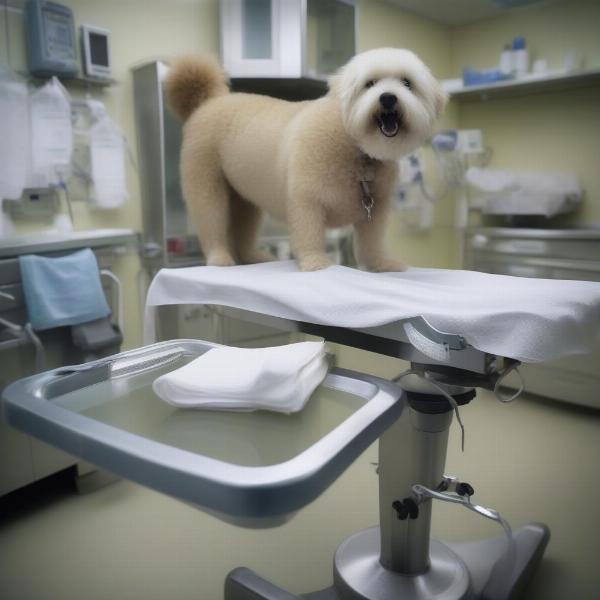Understanding the cost of dog anus gland removal is a crucial aspect of responsible pet ownership. This procedure, also known as anal sacculectomy, can vary in price depending on several factors. This comprehensive guide will delve into those factors, helping you prepare financially and understand what to expect throughout the process.
Factors Influencing Dog Anus Gland Removal Cost
The cost of dog anus gland removal can fluctuate based on your geographical location, the specific veterinary clinic, and the complexity of your dog’s case. Other contributing factors include pre-operative blood work, anesthesia, pain medication, and any necessary follow-up care.
Location, Location, Location
Veterinary costs, like many other services, vary significantly depending on where you live. Metropolitan areas often have higher overhead costs, which can translate to more expensive procedures. Rural clinics may offer lower prices, but access to specialized care might be limited.
The Veterinary Clinic
Choosing a veterinary clinic involves more than just cost. While some clinics might advertise lower prices, it’s essential to prioritize quality of care and experience. Look for a reputable clinic with a board-certified veterinarian specializing in surgery. This can ensure your dog receives the best possible treatment, even if the initial cost is slightly higher.
Complexity of the Case
Simple anal gland removal in a healthy dog is generally less expensive than a procedure involving complications, such as ruptured or infected anal glands. Pre-existing health conditions can also impact the overall cost.
 A dog undergoing anal gland removal surgery.
A dog undergoing anal gland removal surgery.
What to Expect During the Procedure
Before the surgery, your veterinarian will likely recommend pre-operative blood work to ensure your dog is healthy enough for anesthesia. During the procedure, your dog will be under general anesthesia. The veterinarian will make an incision to remove the anal glands. Post-operative care includes pain medication and monitoring for any complications.
Recovery and Aftercare
dog anus gland removal recovery is crucial for a successful outcome. Your veterinarian will provide specific instructions regarding wound care, activity restrictions, and pain management. Regular check-ups are also essential to monitor healing and address any potential issues.
Minimizing Recurring Anal Gland Issues
While anal gland removal is often a permanent solution, some preventative measures can minimize the risk of recurring issues. A balanced diet rich in fiber can help promote healthy bowel movements, which can naturally express the anal glands. Regular exercise and maintaining a healthy weight can also contribute to overall anal gland health.
Are There Alternatives to Anal Gland Removal?
In some cases, less invasive options, such as manual expression or medical management, might be suitable. Discuss these alternatives with your veterinarian to determine the best course of action for your dog.
Conclusion
Understanding the cost and process of dog anus gland removal is essential for responsible pet owners. While the cost can vary, prioritizing quality care and a reputable veterinarian is paramount. By understanding the factors influencing the cost and what to expect during and after the procedure, you can make informed decisions and ensure your furry friend receives the best possible care. dog anus gland removal can significantly improve your dog’s quality of life when necessary.
FAQ
- How much does dog anus gland removal cost? The cost varies depending on location, clinic, and complexity but can range from a few hundred to over a thousand dollars.
- Is dog anus gland removal painful? The procedure is performed under general anesthesia, so your dog won’t feel pain during the surgery. Post-operative pain management is provided.
- How long does recovery take? Recovery typically takes a few weeks, with full healing expected within a month.
- Are there any complications associated with the procedure? While rare, complications such as infection or fecal incontinence can occur.
- Can anal gland problems be prevented? A high-fiber diet, regular exercise, and maintaining a healthy weight can help prevent some anal gland issues.
- Are there alternatives to surgery? Yes, manual expression and medical management are sometimes viable options.
- When should I contact my veterinarian? Contact your vet if your dog shows signs of anal gland problems, such as scooting, licking, or discomfort.
ILM Dog is a leading international online resource dedicated to providing expert advice on all aspects of dog care and wellbeing. From breed selection and puppy care to senior dog health and training tips, we offer a wealth of reliable information to support dog owners worldwide. For expert advice tailored to your dog’s specific needs, contact us at [email protected] or call us at +44 20-3965-8624. ILM Dog is committed to helping you provide the best possible care for your canine companion.